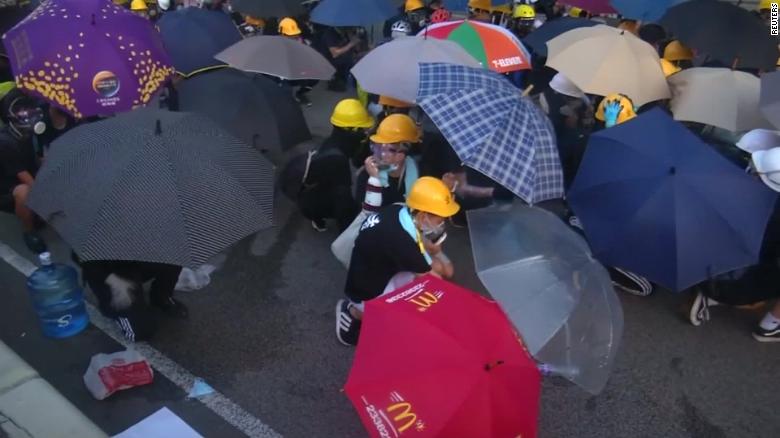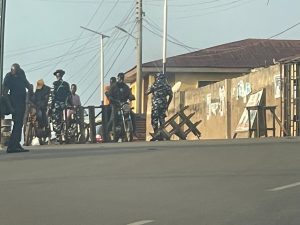Chinese army on Hong Kong’s streets would backfire on Beijing

As Hong Kong’s pro-democracy protests grow in frequency and intensity, the commander of the city’s PLA garrison spoke about the demonstrations for the first time last week, saying that violence “should not be tolerated.” Since then Hong Kong has witnessed another five consecutive days of mass protests, which have shut down stores, disrupted air travel and led to clashes between police and demonstrators. The Hong Kong stock market had its worst day in months on Monday. While there has been no indication yet that Beijing is planning to deploy troops to restore order, the fear of PLA intervention has spread through the city and triggered memories of the brutal 1989 Tiananmen Square crackdown.But a decision to put PLA boots on Hong Kong streets would be “unimaginably detrimental” to the city and its economy, said Willy Lam, adjunct professor at the Chinese University of Hong Kong. The stock market would likely crash, followed by the housing market. A mass exodus could follow. Hong Kong’s government is legally allowed to request help from the PLA garrison of more than 6,000 soldiers if public order in the city spirals out of control. But given Hong Kong’s close ties to mainland China, a decision to deploy them could ricochet through the entire country at a time when the world’s second biggest economy is already vulnerable because of the trade war with the United States.”Even 100 soldiers in the central business district, if they suddenly appeared on the front page of all major newspapers, it would have a very chilling impact on multinational companies based in Hong Kong,” Lam said.Hong Kong’s special statusThe former British colony was handed back to Beijing in 1997 but is now run under its own special system of laws that give it greater economic and social freedoms than mainland Chinese cities.That has helped protect Hong Kong’s reputation as one of the world’s most important financial hubs. It is considered a safe and stable place where foreign companies and investors can operate. Many multinational companies come to Hong Kong to do business in China, while Chinese companies use its stock market to raise capital.Chinese tech giant Alibaba (BABA) is even mulling a $20 billion secondary listing in Hong Kong after its hugely successful New York listing in 2014. Hong Kong’s special status has massively benefited the Chinese economy. It gives the country a way to accept huge investment and commerce from international companies without completely opening its market.In 2016, 61% of China’s foreign direct investment, or $82 billion, came through Hong Kong, according to the Hong Kong Monetary Authority.But the large protests — which have attracted millions of people — have disrupted the city. In June, when the biggest protests started, Hong Kong’s retail sales fell 6.7%, according to Chinese state media.Singapore beckons Hong Kong’s stock market, the fifth largest in the world by market capitalization, would likely drop sharply as soon as the PLA appeared. That could wipe billions off the value of companies.And given the serious damage to the city’s reputation as a place where businesses are more or less free to operate without Beijing’s interference, it isn’t clear when or if the stock market would recover.In the face of that kind of instability, corporations would begin to reconsider their investment in the city, said Lam, the Hong Kong politics expert. Companies could look to relocate major operations.”They wouldn’t close their operation in Hong Kong entirely but would move substantial parts to Singapore and make it their regional headquarters,” he said. “Large numbers of Hong Kong residents from the middle class … backgrounds might start emigrating to English-speaking countries.”Evidence of an exodus from the city would likely crash Hong Kong’s property market, too.That’s before any knock-on effects on the Chinese economy — which has already been slowing — from the loss of Hong Kong’s economic vibrancy and international standing.Some US politicians have even suggested they’d push for an official re-evaluation of Hong Kong’s “most-favored-nation” trade status with the United States if the situation grew too dire. That special status gives countries certain trade advantages, including lower tariffs on imported goods, according to the US government.A bipartisan group of US senators introduced the “Hong Kong Human Rights and Democracy Act” in June, which requires an annual check that Hong Kong is autonomous enough “to justify special treatment.”Diplomatic falloutPresident Donald Trump said Thursday that he would leave any problems in Hong Kong to the Chinese government. “That’s between Hong Kong and that’s between China, because Hong Kong is a part of China … they don’t need advice,” he told reporters outside the White House.But foreign governments would pay very close attention to any PLA deployment. Partly due to its status as a global financial hub, Hong Kong is a major destination for expatriates from across the world.Hundreds of thousands of citizens of Australia, France, the United Kingdom and the United States could be affected by a crackdown in Hong Kong.”The diplomatic and reputational hit to China would be huge if there’s another Tiananmen-like incident, because it would be broadcast and live-tweeted to the world,” said Ben Bland, research fellow at Sydney’s Lowy Institute, an Australian think tank.When the PLA was deployed to the streets of Beijing in 1989 to clear pro-democracy protesters, leading to many deaths, the international community quickly condemned the military action.But Bland said the reaction globally could be even more chilly if the PLA moved again to crack down in Hong Kong.”We’re in a much more bitter era of entrenched competition between the US and China in particular, as well as China and other Western powers,” he said.”It would underline for a lot of people that it’s almost impossible to do business with China and even live with China.”CNN Business’ Sherisse Pham contributed to this report.







